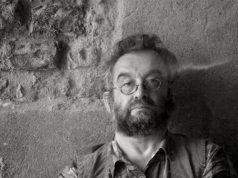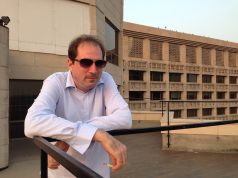Civil society in Odessa continues to struggle for justice and equality for local Roma populations in the wake of tragic events in the region.
Life for Ukraine’s Roma population has never been easy, but for their communities in and around Odessa, the last several months have been especially difficult. Long-standing ethnic friction came to a head this past autumn resulting in an international scandal as well as what will doubtless be long lasting after effects.
In late August, the body of a nine-year-old girl was discovered in an abandoned house near the village of Loshchynivka. Forensic findings also concluded that she had also been raped. A 21-year-old local representative of the Roma community was apprehended as a suspect, triggering reprisals by locals, who blamed the Roma community collectively for the ghastly murder.
A large group of young men attacked the homes of the local Roma community, which numbers around 50, setting one house alight, smashing windows, and destroying furniture, before the authorities eventually intervened. Local Roma avoided harm because they had been evacuated prior to the mob’s arrival and the pogrom that followed. Alarmingly, the village council proceeded to adopt a “non-binding” resolution to expel the local Roma from their homes and to make the village a no go area for individuals of Roma descent. Under pressure from the local population, at least six families were evicted, though Valentina Stoykova, head of the district administration of the Izmail region, claims that they left voluntarily, as they understood that under such conditions “they could not live peacefully.” The actions of local would-be vigilantes and the district administration mirror anti-Roma activities which have become more prevalent throughout Europe in the past half decade.
The pogrom and the forced evictions were met with mixed reactions throughout Ukrainian society. Roma organizations banded together to decry the actions of the Loshchynivka village council, as well as the inaction of local authorities during the pogrom. Legal representatives of the Ukrainian Roma community demanded that Interior Minister Arsen Avakov initiative criminal proceedings against the head of the Loshchynivka village council, and launch an investigation into local authorities’ and law enforcement responses to the incident. Ukraine’s Human Rights Ombudsman, Valeria Lutkovska, made a statement condemning the village council’s resolution on eviction as “violating the rights to freedom of movement and freedom of choice of the place of settlement of Roma,” as well as criticizing the act as “discrimination on the basis of ethnicity.”
In Odessa’s local government, attitudes towards the victims of the eviction were less favorable: former Odessa governor Mikhail Saakashvilli voiced sympathy for the residents of Loshchynivka who took part in the attack on Roma homes. He referred to the region as “a den where there is an active drug trade in which the anti-social elements that live there are engaged.” Such sweeping accusation against the Roma community are not new, but they were particularly threatening coming from the governor as well as his subordinates. Saakashvilli was roundly criticized for his his lack of tact and potentially destabilizing words in the Western press. Roma activists such as Alena Kazanskaya of the NGO “Romano Drom” pointed out the poignant language used by local politicians criticizing Roma: “Let us remember the case of the Crimean Tatars, who were also considered ‘asocial’.”
More than five months later, the Roma community in Odessa, and throughout Ukraine, continue to struggle against everyday discrimination and the grim memories of the events that took place in Loshchynivka. In the immediate aftermath of the eviction, Roma activists engaged in a surge of activity that included organizing campaigns to increase awareness. In Lviv, the organization “Ternipe” held a series of trainings for Roma youth in self-government at the end of August. Participants in the training launched a social media campaign under the hashtag “#I_am_Roma_but_I_am_not_a_criminal”. Roma youth photographed themselves holding signs with statements such as “There is no such thing as a bad nationality, only bad people,” and “I want to feel safe in Ukraine”. The messages were written in both English and Ukrainian, intended for both a local and international audience.
In Odessa, the Roma Human Rights Protection Center is at the forefront of local efforts, providing pro bono legal aid and consultation to members of the Roma community. Volodimir Kondur, director of the organization and head of the Coalition of Roma NGOs in Ukraine, spoke with The Odessa Review, and explained his organization’s current objectives. Volodimir and his associates continue to focus on “the appeal to the courts regarding illegal actions of the village authorities and police [as well as] the opening of a criminal case against the Izmail region police in relation to the destruction and burning of homes.”
When asked about how the situation has changed, Volodimir does not mince his words. “The situation has not changed. The authorities do not want to resolve this issue; housing has not been provided for the Roma.” His frustration is understandable: Volodimir and his colleagues have encountered numerous hurdles in the legal process over the past months, including the refusal of the office of the Odessa Regional Prosecutor to recognize the Roma’s victim status. After considerable effort by Volodimir and his associates, the court has now acknowledged their status. However, it is clear that the representatives of the Roma community sense a lack of commitment on the part of regional authorities to resolve the problem and address the their grievances.
While the Roma Human Rights Protection Center works largely in the legal sphere, they understandably wish to see broad changes in Ukrainian society as well – in particular, the recognition that “Roma are citizens with equal rights, and a part of civil society […] we support all defenders of human rights, and know especially well that the truth is the most important thing.” Activities such as the social media campaigns undertaken by Roma in Lviv play an important role, but it is evident that Volodimir believes justice for the events at Loshchynivka will be won only in the courts.
Volodimir sees the legal proceedings following the forced eviction at Loshchynivka as emblematic of the development of the rule of law in Ukraine. That is not to say that he and others are not hopeful, however. “Ukraine is in the midst of a process of democratic reform, and is still weak as a state,” he explains. “But the spirit of Ukrainians towards freedom is very strong, and the Roma people will always defend freedom and justice.”
Jack Margolin is an Associate Editor at The Odessa Review.




































